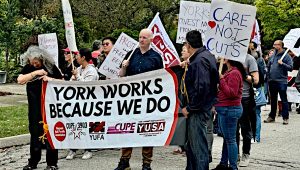华工网络对增加物业税和市长预算案的声明
华工网络支持多伦多市长邹至蕙的2024年财政预算案。 尽管物业税增加9.5%的建议颇为吓人,但重要的是要反映我们希望建设的城市的价值观,即同情、包容和致力于所有居民福祉的价值观。 「我们为自己谋求的,我们也是为他人谋求的」,这句话在劳工运动的历史中根深蒂固,表明了团结和集体福祉的重要性。 正如加拿大邮政工人工会在1981年为产假福利而罢工,最终成为国家标准一样,我们面临决择关于我们对多伦多的展望。

我们面临的问题——关于我们想要建设什么样的城市——与我们的社会价值观有着根本的联系。 我们想要一个对居民需求视而不见的城市吗?或者我们是否渴望创造一个空间,让每个人,无论他们的情况如何,都能获得他们茁壮成长所需的资源和服务?
这些问题的答案反映了塑造我们城市的价值观,它们要求我们致力于建立一个重视包容性和社会责任的社区。 虽然面临增加9.5%的物业税可能会引起人们的担忧,但关键的是要认识到更广泛的背景。 前几任市长试图从省政府和联邦政府获得财政支持的努力都失败。 然而,现任市长在短时间内成功地获得了两级政府的承诺。
9.5%的物业税增加,平均每天80仙,成为对关键服务的有形投资,例如,道路和公共设施的维修,士嘉堡公车专用道,护理人员和消防服务、长期照护,以及多伦多的社区危机应对。 鉴于上级政府提供的财政支持,这一增长是朝着建设一个反映我们集体价值观的多伦多迈出的关键一步。

值得注意的是,这种增税以支持关键服务的负担对所有居民来说并不相同,其对个人的影响相对较小。 然而,对最弱势群体的影响;那些最需要它的人,是很重要的。 投资这笔适度的金额可以大大有助于维持和加强服务,使多伦多成为一个充满活力和富有同情心的城市。
当我们努力做出这一决定时,让我们记住集体行动的精神,并期望我们的城市恪守原则「我们为自己谋求的,我们也是为他人谋求的」。 支持这次增加物业税,我们为多伦多的建设做出了贡献,让多伦多体现我们共同的价值观,即同情、包容和对所有居民福祉的承诺。
由多伦多和约克地区劳工议会(Toronto & York Region Labor Council)建立的华工网络(CWN)期望一个超越文化或职业界限的城市——一个捍卫所有居民的权利和福祉的城市,无论其背景如何。 这不是华裔居民独有的愿景,而是每个人的共同愿望,无论居住地、年龄、收入或隶属关系如何。
2024年2月13日

CWN Statement on Proposed Property Tax Increase and Mayor’s Budget
The Chinese Workers Network supports Toronto Mayor Olivia Chow’s 2024 Budget. While the prospect of a 9.5% property tax increase can be daunting, it is important to reflect on the values that define the kind of city we wish to build, the values of compassion, inclusion, and a commitment to the well-being of all its residents. The phrase “What we want for ourselves, we want for others,” ingrained in the labor movement’s history, shows the importance of solidarity and collective well-being. Just as the Canadian Union of Postal Workers went on strike in 1981 for maternity leave benefits that eventually became a national standard, we are faced with decisions about the Toronto we envision.

The questions we face—about the type of city we want to build—are fundamentally linked to our social values. Do we want a city that turns a blind eye to the needs of its residents? Or do we aspire to create a space where everyone, regardless of their circumstances, has access to the resources and services they need to thrive?
The answers to these questions reflect the values that shape our city, and they demand a commitment to building a community that values inclusivity and social responsibility. While facing a 9.5% property tax increase may raise concerns, it is crucial to recognize the broader context. Attempts by previous mayors to secure financial support from the provincial and federal governments have failed. However, the current Mayor has successfully garnered commitments from both levels of government within a short timeframe.
The 9.5% property tax increase, when viewed as an average of 80 cents per day, becomes a tangible investment in critical services, such as the repair of roads and public spaces, the Scarborough Busway, paramedic and fire services and in the long-term care, and community crisis response in Toronto. In light of the financial support secured from higher levels of government, this increase is a critical step towards building a Toronto that reflects our collective values.

It’s worth noting that the burden of this tax increase to support critical services is not the same for all residents, and its impact on individuals is relatively modest. Yet the impact on the most vulnerable; those who need it the most, is significant. Investing this modest amount can contribute significantly to maintaining and enhancing the services that make Toronto a vibrant and compassionate city.
As we grapple with this decision, let us remember the spirit of collective action and envision a city that stands true to the principle: “What we want for ourselves, we want for others.” In supporting this property tax increase, we contribute to the construction of a Toronto that embodies our shared values of compassion, inclusion, and a commitment to the well-being of all its residents.
The Chinese Workers Network (CWN), established by the Toronto & York Region Labour Council, envisions a city that transcends cultural or occupational boundaries—a city that champions the rights and well-being of all residents, irrespective of their background. This is not a vision exclusive to Toronto residents of Chinese heritage but a shared aspiration for everyone, regardless of age, income, or affiliations or place of domicile.
February 13, 2024




